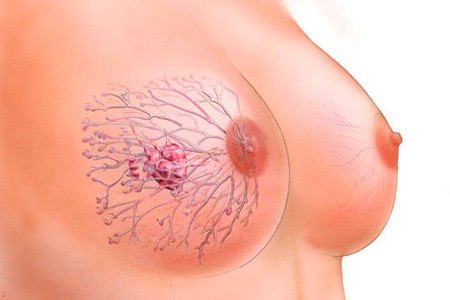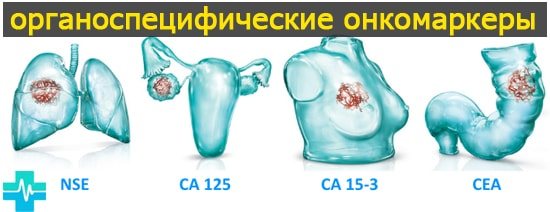general description
- CA 125
- CA 15-3
- CA 19-9
- CA 72-4
- Cyfra 21-1
- Alpha fetoprotein (AFP)
- Carcinoembryonic antigen (CEA)
Tumor markers are protein structures with carbohydrate or lipid components, which, when present in tumor cells or blood serum, serve as an indicator of a malignant process in the body.
The study of tumor markers allows us to obtain valuable diagnostic information that allows us to assume the presence of a malignant neoplasm and select the optimal sequence of examination of the patient. It should be remembered that a negative result when determining tumor markers cannot in all cases be considered a sign of the absence of oncopathology. A number of tumor markers can manifest themselves both in a specific cancer disease and in a number of others. Often, an increase in tumor marker concentration appears much earlier than the clinical symptoms of the disease itself. In practical medicine, tumor markers are used mainly to monitor the course of the disease and the effectiveness of its treatment. How is the procedure done?
Blood is drawn from the ulnar vein. Testing for on-comarkers does not require special preparation.
CA 125
Carbohydrate antigen 125 (CA 125) is a specific marker for ovarian tumors.
Indications for the purpose of analysis:
- prognosis of the course of the disease;
- timely detection of metastasis;
- assessment of the effectiveness of therapy for ovarian cancer.
| Norm CA 125 | |
| 4.0-8.8×109/l |
Interpretation of results
Increased Ca-125 levels
Malignant neoplasms:
- ovarian cancer;
- uterine cancer;
- endometrial cancer;
- fallopian tube cancer;
- mammary cancer;
- pancreas cancer;
- rectal cancer;
- stomach cancer;
- lungs' cancer;
- liver cancer;
- bronchial cancer.
Non-oncological processes:
- polycystic ovary syndrome;
- endometriosis;
- adnexitis;
- peritonitis;
- pleurisy;
- chronic hepatitis;
- cirrhosis of the liver;
- chronic pancreatitis.
CA 15-3

Carbohydrate antigen 15-3 (CA 15-3) is a specific marker of breast tumors. The appearance of this marker in tests significantly precedes the appearance of symptoms of the disease.
Indications for the purpose of analysis:
- prognosis of the course of the disease;
- detection of early relapses;
- detection of metastases;
- treatment effectiveness;
- distinctive diagnosis of breast cancer and benign mastopathy.
| Norm CA 15-3 | |
| in serum - 9.2-38 U/l |
Interpretation of results
CA 15-3 Level Up
Malignant neoplasms:
- mammary cancer;
- bronchogenic cancer;
- stomach cancer;
- liver cancer;
- pancreas cancer;
- ovarian cancer;
- cervical cancer;
- uterine cancer;
- endometrial cancer.
Non-oncological diseases:
- benign diseases of the mammary glands;
- cirrhosis of the liver;
- pregnancy in the third trimester;
- autoimmune diseases.
CA 19-9
Carbohydrate antigen 19-9 (CA 19-9) is a marker of malignant tumors of the gastrointestinal tract. Not having high specificity, it is most sensitive to pancreatic cancer (in 82% of cases), tumors of the liver and biliary tract (in 76% of cases).
Indications for the purpose of analysis:
- monitoring the course of pancreatic cancer;
- timely detection of metastasis;
- assessing the effectiveness of pancreatic cancer treatment;
- observation of patients with probable recurrence of stomach cancer - in combination with CEA;
- CEA-negative colon tumors.
| Norm CA 19-9 | |
| in serum - 0-37 U/ml |
Interpretation of results
CA level increase 19-9
Malignant neoplasms:
- pancreas cancer;
- cancer of the gallbladder and bile ducts;
- bladder cancer;
- primary liver cancer;
- stomach cancer;
- rectal cancer;
- sigmoid colon cancer;
- mammary cancer;
- ovarian cancer;
- uterine cancer.
Non-oncological pathology:
- cirrhosis of the liver;
- cholecystitis;
- cystic fibrosis;
- hepatitis;
- cholelithiasis.
CA 72-4
Carbohydrate antigen 72-4 (CA 72-4) is a marker for stomach, ovarian and lung tumors, but is most sensitive to stomach tumors.
Indications for the purpose of analysis:
- timely diagnosis of stomach and ovarian cancer;
- assessment of the effectiveness of surgical treatment;
- prognosis for stomach, ovarian, and colorectal cancer.
| Norm CA 72-4 | |
| in serum - less than 6.9 U/ml |
Interpretation of results
CA 72-4 Level Up
Malignant neoplasms:
- stomach cancer;
- colon cancer;
- ovarian cancer;
- breast cancer;
- lungs' cancer;
- endometrial cancer;
- pancreas cancer.
Non-oncological diseases:
- pancreatitis;
- cirrhosis of the liver;
- pulmonary pathology;
- ovarian cysts;
- autoimmune diseases;
- gynecological diseases.
Cyfra 21-1
Cytokeratin 19 fragment (Cyfra 21-1) is the most specific marker of bladder cancer and non-small cell lung cancer. Particularly informative when simultaneously determined together with REA.
Indications for the purpose of analysis:
- timely detection of lung cancer;
- lung cancer prognosis;
- bladder cancer prognosis;
- monitoring the effectiveness of surgical treatment.
| Cyfra Standard 21-1 | |
| in serum - up to 3.3 ng/l |
Interpretation of results
Cyfra boost 21-1
Malignant diseases:
- bladder cancer;
- lung cancer;
- cervical cancer;
- malignant tumors of the head and neck;
- esophageal carcinoma.
Non-oncological diseases:
- chronic renal failure;
- chronic hepatitis;
- pneumofibrosis.
AFP (alpha fetoprotein)
Alpha-fetoprotein (AFP, alfa-Fetoprotein) is a marker of primary liver cancer in oncology.
Indications for the purpose of analysis:
- monitoring the course of the disease;
- timely detection of metastasis;
- assessment of the effectiveness of treatment;
- detection of metastasis in the liver;
- examination of risk groups of patients with liver cirrhosis, chronic HBs-positive hepatitis, α1-antitrypsin deficiency.
| AFP norm | |
| Adult men and non-pregnant women: 0.90–6.67 U/ml |
Interpretation of results
Increase in AFP indicators
Oncological pathology:
- primary liver cancer;
- teratoblastoma of the testes and ovaries;
- pancreas cancer;
- stomach cancer;
- colon cancer;
- lungs' cancer.
Somatic pathology:
- chronic hepatitis;
- cirrhosis of the liver;
- alcoholic liver disease.
Decrease in AFP indicators
- tumor removal;
- adequate antitumor therapy.
A repeated increase or insufficient decrease in AFP may indicate relapse of the disease or the onset of metastasis.
CEA (carcinoembryonic antigen)
Carcinoembryonic antigen (CEA, CEA, antigen CD66E) is a nonspecific tumor marker. It is practically not detected in the serum of healthy adults, including pregnant women. But in the presence of a tumor process, the concentration of CEA in the blood increases significantly. Marker of tumors and their metastases.
Indications for the purpose of analysis:
- timely detection of tumors during examination of risk groups;
- monitoring the course of the disease;
- detection of early relapses and monitoring the effectiveness of surgical treatment of colorectal cancer, tumors of the breast, stomach, and lung.
| REA norm | |
| from 0 to 6.3 ng/ml |
Interpretation of results
Increasing REA indicators
CEA indicator 20 ng/ml and above:
- colon cancer;
- rectal cancer;
- stomach cancer;
- lung cancer;
- mammary cancer;
- malignant tumors of the pancreas;
- metastases to the liver, bone tissue;
- tumors of the prostate, ovaries.
CEA indicator within 10 ng/ml:
- cirrhosis of the liver;
- chronic hepatitis;
- colorectal polyps;
- ulcerative colitis;
- chronic pancreatitis;
- tuberculosis;
- pneumonia;
- cystic fibrosis;
- renal failure;
- Crohn's disease;
- autoimmune diseases;
- heavy smoking;
- malignant tumors of the rectum;
- distant metastases after tumor surgery.
Tumor markers as relative indicators of cancer risks

In other words, tumor markers are relative indicators for assessing the likelihood of cancer.
The final diagnosis can be made after a CT scan, MRI, biopsy or histology from a tissue sample.
Please note that accurate diagnosis of the disease is very important in order to properly plan surgical intervention. Both elevated and normal results when donating blood for tumor markers will not give an accurate answer about the presence of oncology. In this case, specific proteins are often used to monitor the dynamics of antitumor treatment.
Norms
| Parameter | Norm |
| Carbohydrate antigen 125 (CA 125) | in serum - 2.6-18 U/l |
| Carbohydrate antigen 15-3 (CA 15-3) | in serum - 9.2-38 U/l |
| Carbohydrate antigen 19-9 (CA 19-9) | in serum - 0-37 U/ml |
| Cytokeratin 19 fragment (Cyfra 21-1) | in serum - up to 3.3 ng/l |
| Alpha-fetoprotein (AFP, alfa-Fetoprotein) | adult men and non-pregnant women: 0.90-6.67 U/ml |
| Carcinoembryonic antigen (CEA, CEA, antigen CD66E) | from 0 to 6.3 ng/ml |
Diseases for which a doctor may prescribe a tumor marker test
Lung cancer
In lung cancer, there is an increased level of CA 125, an increased level of CA 72-4, an increased level of Cyfra 21-1, an increased level of AFP, and a CEA concentration of 20 ng/ml or higher.
Esophageal carcinoma
In esophageal cancer, the concentration of Cyfra 21-1 is increased.
Endometriosis
Increased levels of CA 125 are observed in endometriosis.
Crohn's disease
In Crohn's disease, the concentration of CEA is within 10 ng/ml.
Peritonitis
With peritonitis, an increased level of CA 125 is observed.
Stomach cancer
In gastric cancer, there is an increased level of CA 125, an increased level of CA 15-3, an increased level of CA 19-9, an increased level of CA 72-4, an increased level of AFP, and a CEA concentration of 20 ng/ml or higher.
Adnexit
With adnexitis, an increased level of CA 125 is observed.
Chronic pancreatitis
In chronic pancreatitis, an increased level of CA 125 is observed, the concentration of CEA is within 10 ng/ml. In pancreatitis, the concentration of CA 72-4 is increased.
Liver cancer
In liver cancer, elevated levels of CA 125, CA 15-3, CA 19-9, and AFP are observed.
Pulmonary tuberculosis (miliary)
In tuberculosis, the concentration of CEA is within 10 ng/ml.
Mammary cancer
In breast cancer, the CA 125 level is elevated, the CA 15-3 concentration is elevated, the CA 19-9 level is elevated, the CA 72-4 concentration is elevated, the CEA concentration is 20 ng/ml or higher.
Chronic renal failure
In chronic renal failure, the concentration of Cyfra 21-1 is increased, the concentration of CEA is within 10 ng/ml.
Chronic hepatitis
In chronic hepatitis, there is an increased level of CA 125, Cyfra 21-1, and the concentration of CEA is within 10 ng/ml. In hepatitis, the level of CA 19-9 is elevated.
Cirrhosis of the liver
In liver cirrhosis, increased levels of CA 125, CA 15-3, CA 19-9, CA 72-4, AFP, and CEA concentrations are observed within 10 ng/ml.
Ulcerative colitis
In ulcerative colitis, the concentration of CEA is within 10 ng/ml.
Malignant neoplasm of the colon
In colon cancer, the concentration of CA 72-4 is increased, the level of AFP is increased, and the concentration of CEA is 20 ng/ml or higher.
Polycystic ovary syndrome
In polycystic ovary syndrome, there is an increased level of CA 125.
Pulmonary tuberculosis (focal and infiltrative)
In tuberculosis, the concentration of CEA is within 10 ng/ml.
Malignant neoplasm of the bladder
In bladder cancer, increased levels of CA 19-9 and Cyfra 21-1 are observed.
Cystic fibrosis
In cystic fibrosis, an increased level of CA 19-9 is observed, the concentration of CEA is within 10 ng/ml.
Tumor marker B-2-MG (Beta-2-microglobulin)
The tumor marker Beta-2-microglobulin can be found in all cells except red blood cells and trophoblast cells.
Normally, Beta-2-microglobulin is detected in urine in very small quantities.
An increase in blood concentration may indicate renal failure.
The level of this marker is associated with the activity of the immune system and can increase with any inflammatory disease.
An analysis for Beta-2-microglobulin is prescribed for suspected:
- multiple myeloma,
- B-cell lymphocytic leukemia,
- lymphomas.
It is recommended to take into account the B-2-MG indicator when assessing survival after organ transplantation.










